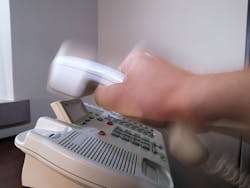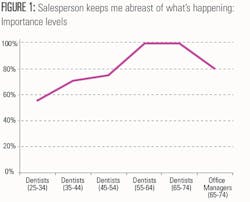No hang ups, closed doors, or cold shoulders here: How to build rapport with dentists and drive sales
If you are a dentist, you probably get 20 unsolicited e-mails, phone calls, and office visits daily from salespeople.
Even though dentists need sales reps and sales reps need dentists, unfortunately the two don't always come together as easily as toothpaste on a toothbrush.
Using Vennli, a choice visualization and analytics platform, we asked 112 dentists and dental professionals what matters most to them when it comes to interacting with dental sales executives. Based on these findings, here are the top five things sales reps need to know about building stronger rapport with dentists in order to drive sales.
5. Name dropping with doctors isn't as important as you think
If your first inclination is to rattle off the names of other dentists already using your product or services, don't be so hasty. According to our research, although 78% of dental sales reps believe it is important to demonstrate that you work with other well-known professionals, it turns out that only 61% of dentists agree. Dentists also ranked the size of the company, number of employees, and booth size as factors having low importance scores. With that said, 80% of office managers rank name dropping as highly important.
4. Offer incentives and discounts to buy
In the study, only 61% of dental sales reps think dentists place high importance on incentives and discounts. However, 87% of dentists and 80% of office managers see it as highly important. In my bag-carrying days and during my years as sales VP for a dental company, I learned dental practices were often more likely to take action if they felt a sense of urgency. Offering time-sensitive discounts is one way to increase urgency, and it's clearly valued by dental practices.
READ MORE | Understanding dentists' decision making with the magic of Venn
3. Educate them and they will come
Both sales representatives and dental professionals place high importance on sharing industry news and trends. However, depending on the age of the dentists, those results varied significantly. 100% of dentists between ages 55 and 74 ranked it as their single most important factor, while only 56% of younger dentists, aged 25-34, ranked it as important (figure 1).
When you provide value during the sales process and build your credibility as an expert, you create a strategic partnership with your prospects. When you can provide information that dentists do not otherwise have access to or know, then you are providing value. Perhaps younger dentists place less importance on this factor because they are receiving information in other places, but it's still a worthwhile practice to build rapport. Take what you know and share that knowledge. If you read an interesting article (like this one!), share it with someone you know. If anything, it lets them know that you are thinking of them and keeps you front of mind.
2. Respect their time
Ninety-five percent of respondents place a high degree of importance on the sales rep respecting the dentist's time and 96% on the timeliness of the sales rep's responses. This shouldn't come as a surprise since dentists' schedules are blocked off in five to 15 minute increments. If you want to increase your probability of connecting with the dentist, plan to do so during the office's slower times. Most patients want to see their dentist before and after work. Dentists' busiest times are between 7:00 and 10:00am and again between 3:00 and 6:00pm. The lunch hour can be one of the best times to plan to connect. Wednesday and Friday tend to be slower clinical days in dental practices and can often be dedicated as administrative. Learn each practice's hours of operation and ask about the best time to connect. One of my favorite days to call a dentist or a dental specialist is the first day of school. Unless the dentist is on vacation, it's highly likely their schedule is less full because patient families are otherwise committed!
READ MORE |Pick us, Dr. Dentist, pick us! Understanding how dentists make purchasing decisions
1. Build the pain
Back when I was selling directly to dentists, we had an acronym we lived by-PIG, which stood for Pain, Impact, and Goals. Unless we understood the pain the dentist was in and how our products or services would impact that pain and the goals of the dentist, we were unlikely to gain their business. The research in this Vennli study supports this best practice. Ninety-three percent of dentists and 100% of office managers say they are willing to interact with a dental sales representative if they have a need for their products and services. Therefore, to drive more sales, you need to increase the awareness of their need (build the pain!) so that they are more open to considering your products.
Bring it all together
Being a sales representative (dental or otherwise) requires a consultative approach-no one wants to be "sold." People want to be listened to and understood, and they want to interact with credible experts who provide value and solve a problem they have. Dentists rely on their sales representatives to understand their business and be capable of intelligently presenting ways they can improve their practices.
As you work to bridge the connection to dentists, keep these factors in mind: focus on their need, get to the point quickly, educate them, and find ways to incentivize them to buy.
Here's to successful third and fourth quarters! Good luck!
READ MORE | 6 tips to improve Facebook engagement with dentists: Study of over 600 dental companies' Facebook strategies
For the most current dental headlines, click here.
Rachel Mele is a dental executive, author, and international speaker. She runs the dental division at Vennli, a cloud platform for gathering real-time insights about what's most important to dentists and why they choose you versus your competition. She can be reached at [email protected].



